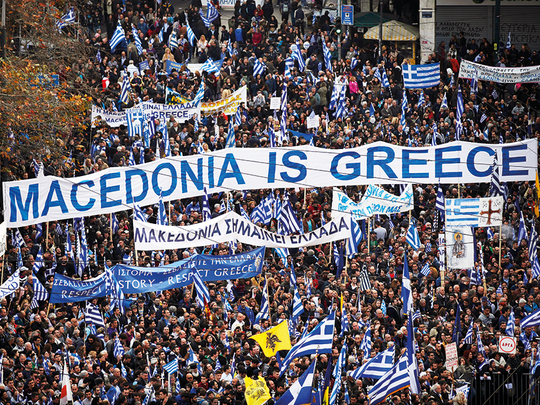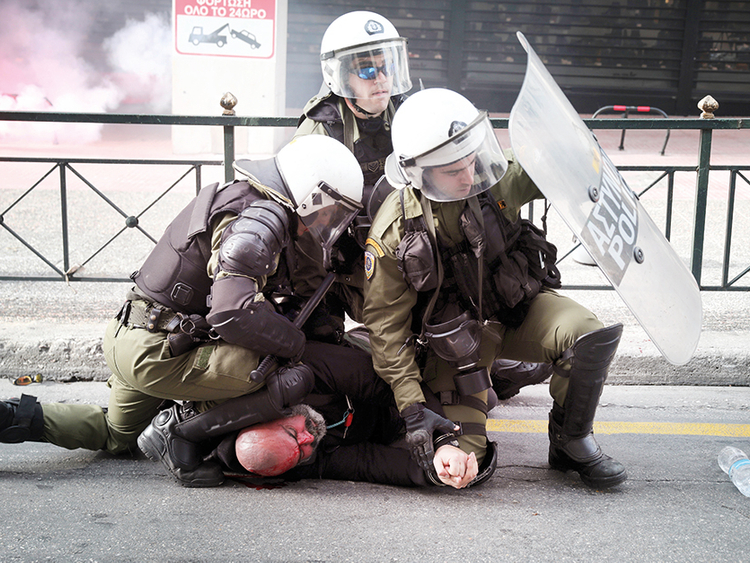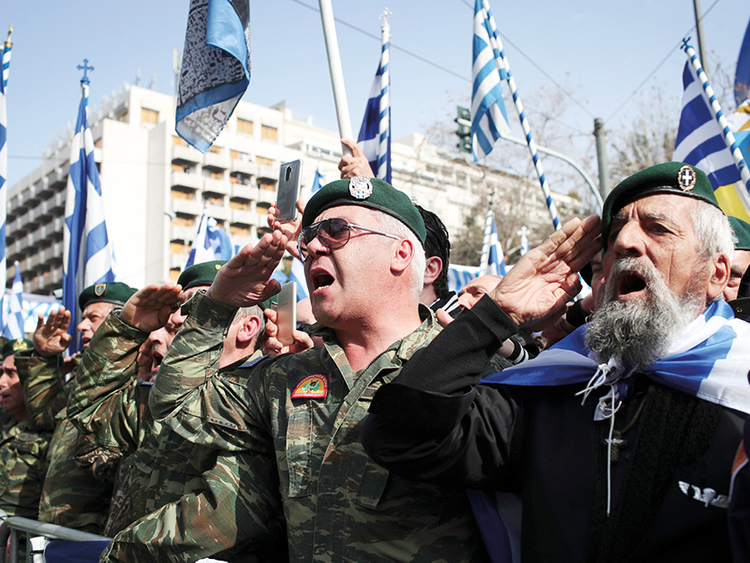
MADRID: Waving blue and white flags and singing their national anthem, more than 140,000 Greeks rallied in front of their parliament in Athens on Sunday in a show of opposition to neighbouring Macedonia.
This is a dispute that has been simmering since September 1991, with the former Yugoslavia breaking up following the collapse of the Soviet bloc. Since then, and the creation of modern-day Macedonia, its very name has been at the centre of the feud between the governments in Skopje and Athens.
For Greeks, where its most northwesterly province is named Macedonia, the neighbouring nation cannot claim usage nor lay claim to the historical legacy of Alexander the Great.
In 1991, with the break-up of Yugoslavia, the new nation was permitted to join the United Nations under the provisional name “The Former Yugoslav Republic of Macedonia” — or FYROM — and even then, Athens objected to the use of the word ‘Macedonia’. Some 130 countries simply refer to FRYOM as ‘Macedonia’.
For Greeks, however, it is simply referred to as ‘Skopje’, after the ancient city there.
The Greeks also claim that articles in FYROM’s constitution make a territorial claim to their province of Macedonia, helping to fuel the divisions.
Hundreds of buses brought protesters in from around the country to Sunday’s protest, while more people arrived on ferries from the islands. Chanting “Hands off Macedonia!” and “Macedonia belongs to Greece!” the protesters converged on Syntagma Square, in front of the Greek parliament.
Police officials estimated the attendance at 140,000. Organisers, who claimed 1.5 million were at the rally, used a crane to raise a massive Greek flag over the square.
“We are trying to show the politicians ... that they must not give up the name ‘Macedonia’,” said 55-year-old protester Manos Georgiou.
Foreign Minister Nikos Kotzias said last week that Greece is preparing proposals which would be the basis of negotiations for a settlement with its neighbouring country.
“Here are the borders. This is Macedonia ... Macedonia is Greek, no one can take this name, no one can use it,” said protester Rania Mainou, pointing on a map.
The two countries have agreed to step up negotiations, mediated by the United Nations, this year to settle the dispute, which has frustrated the aspirations of Greece’s small northern neighbour to join Nato and the European Union.
Talks also reopened at a sensitive time for a country which is struggling to emerge from its worst debt crisis in decades and to regain sovereignty over economic policy-making after years of austerity mandated by international lenders.
Among Sunday’s speakers was world-renowned Greek composer Mikis Theodorakis, who said the eight-year economic crisis had not wiped Greece’s history from people’s memories.
“If we give in, we are leaving the doors wide open for a tragic historical lie to come through and stay forever,” the 93-year old leftist, a symbol of resistance against the 1967-1974 military junta, told a cheering crowd.
Talks between the two countries have been inconclusive since the Balkan state broke away from Yugoslavia in 1991.
Opinion polls in recent weeks have shown a majority of Greeks oppose the use of ‘Macedonia’ in any solution. About 300,000 people turned out at a demonstration on January 21 in Thessaloniki, the capital of Greece’s Macedonia region.
The issue has also strained relations between Prime Minister Alexis Tsipras’ Syriza party and his small coalition ally, the right-wing Independent Greeks. The coalition government controls 154 seats in the 300-seat parliament.
The Macedonia issue helped bring down Greece’s conservative government in 1993; the same party, now in opposition, has criticised Tsipras’ administration for its negotiating tactics.
— With agencies














